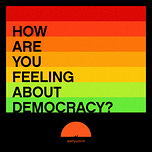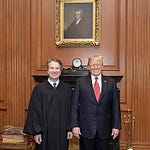Madiba K. Dennie has done the impossible in her new book.
The Originalism Trap tells the history of the conservative legal movement kicking freedom’s ass. Dennie deftly describes how this once-mocked doctrine now dominates our highest court and tens of millions of uteri–and may do so for the rest of our lives. Yet she manages to leave you with some optimism.
This MAGA majority, perhaps more than any other Supreme Court majority in US history, is dominated by pious defenders of your right to practice their religion. And that religion is Originalism.
And since this trap is now your religion, you should know where it came from, what it’s after, and how we escape it. And the perfect person to explain all this is Madiba K. Dennie.
Catch up on all the episodes of “How are you feeling about democracy?” here.
If you want to be a supporter of this podcast, please join us here at the earlyworm society – free or paid, your support matters.
***************
ROUGH TRANSCRIPT
Jason Sattler: Here's my little wind up. I think of your book as a crime story. You write that a conservative extremists have stolen the constitution . So let's look at this crime first. What is originalism and how does it favor the powerful?
Madiba Dennie: Originalism is the idea that the meaning of the Constitution is fixed in time. Originalists say that there's one true, discoverable meaning and its meaning is frozen when the Constitution was enacted. However they ostensibly understood the Constitution then as however they claimed they did, is how we have to understand the Constitution today. And this is an idea that used to be fringe. No one was really buying into this as recently as a few decades ago. But the conservative legal movement made a really dedicated effort to make it the dominant method of Constitutional interpretation, and it's now embraced by a supermajority of the Supreme Court.
Jason Sattler: And what is the trap?
Madiba Dennie: I think that because Originalism has gained such dominance sometimes folks on the left have felt the need to engage with it as if it is legitimate which I think is a mistake. And they sometimes try in arguing on Originalisms terms to see if it's still possible to reach good outcomes, but I think that Originalism was by design structured to create negative, reactionary, conservative policy goals. So you're not actually going to be getting the kind of results you that you want by doing this. And so you're playing this intellectually dishonest game and it's not even something you can win.
Jason Sattler: I could play the quote of Elena Kagan saying...
Elena Kagan: Sometimes they laid down very specific rules. Sometimes they laid down broad principles. Either way, we apply what they say, what they meant to do. So in that sense, we are all Originalists.
Madiba Dennie: I think that Kagan has been a little annoyed with how prevalent that quote became because she doesn't really buy it, I think. I think it was an observation on just, yeah, just how Originalism became the go to thing that everyone accepts as a given. And this is how you have to do things if you want to be taken seriously. And so she was saying, yeah, "I guess we're all Originalists now." And I think that quote has haunted her a bit. I don't think she actually gives Originalism as much credence as some of her colleagues on the bench do.
Jason Sattler: Looking back at this, think one reason to really not give it credence is the origin of where this kind of comes. It went back further than I actually expected. Where you see modern Originalist movement being born?
Madiba Dennie: I think that we are best served. We have the best analysis of Originalism when we look at Brown v. Board and the backlash to the civil rights movement. Because it was in Brown v. Board that the Supreme Court actually solicited arguments that you could characterize as like Originalist. They said, "Can you look to what the Reconstruction amendments Framers were doing at that time and see how they thought that it applied to segregated schools?" This exposed many weaknesses of Originalism because first of all, Originalists claim that this is an objective method. And yet all of the people looking at this history, we're reaching different results because there's not actually a single history. There are multiple ways you could interpret this. So really the history is helping you get to the result you wanted to, but it's not. While raving this banner of neutrality and objectivity. So that's issue one to begin with.
And the second issue is that the the state it was Kansas that was like defending the segregationist policy. They said, "We looked at what the framer said, and there is no evidence that they thought that the 14th amendment should supersede the state's ability to have segregated schools." And then the Supreme Court rejected that argument. They said, you know what? It doesn't actually make sense for us to chain our understanding to what they thought when they were writing, or even what the Supreme Court thought in Plessy v. Ferguson, what makes the actual most sense to do is for us to consider the evolution of the 14th amendment and the evolution of the importance of education in the United States. And so they, instead of looking at some manufactured idea of an original understanding, they focused on the kind of things that really matter, like equality and dignity and these sorts of principles, and like how they inform our, the ongoing democratic project. So that's what the Supreme Court did in Brown. So I think that's strike two against Originalism right there.
And then you get to strike three. Which is, after Brown v. Board is decided, a lot of prominent conservatives are big mad about it. And a lot of the congressional representatives representing the southern states they created this document, formerly titled the Declaration of Constitutional Principles, but it's most commonly known now as the Southern Manifesto. And in this document, they put forth a broad array of Constitutional arguments saying that Brown was not on solid Constitutional ground and that it was like an illegitimate legal decision. And a key point in that was that they strayed from the original understanding of the Framers. And so I think that is the background that people have been overlooking for too long against which Originalism has been formalized as a doctrine. It has from its very genesis and it still continues to be just a cover for reactionary politics.
It's just putting, it's giving white supremacy a law degree but it's still just the same old bigoted backlash that we've been fighting against for years and years but they gave it this veneer of legitimacy by professionalizing it and giving it all these nice sounding legal words and claiming that it's actually a doctrine and the only acceptable way to do a legal interpretation. But when you look at where it came from, it becomes very clear that its only purpose is to further terrible policies.
Jason Sattler: Obviously not a lawyer but if I'm getting this right, this whole kind of method of analysis was invented when the idea that we should end racial segregation became legally viable. Am I getting that right?
Madiba Dennie: Mostly right. I think I would say mostly because the idea of looking at history itself, that isn't new. Folks have considered history before, but the idea that history is the only thing you should consider, that was the new part. That was the response to desegregation innovation on the right.
By saying that there's actually only this one, one true way of doing Constitutional interpretation. And it just so happens that way requires back time reversing all of the civil rights wins that people have fought for. So they're saying that it is basically, by definition, suspect for people to fight for and win their rights over time because they're saying what we should understand as legitimate is whatever was before.
Jason Sattler: It's un-American to to take away from the powerful, I guess is the argument there.
Madiba Dennie: Right.
Jason Sattler: I known the name Robert Bork since I was a little kid and I knew that, Ted speech and he, Got rejected and Republicans have been pissed about it and they use it justify anything, you know That becomes talking point when any thing happens.
Look what you did. I didn't realize what central figure he
Madiba Dennie: Right,
Jason Sattler: Can you tell bit about that?
Madiba Dennie: Yeah. And I think that's a really good point how you mentioned Republicans keep bringing him up as a sort of like a grievance. They can turn to Bork and say, look what you did to him. And. I was shocked as a young adult actually, when I actually learned more about Borks, I think I had heard vaguely this idea of this, that there was some guy named Bork who was wronged for something.
I didn't really know. But then in school, as I learned more about it, I was like, wait a second. It's, this guy was rejected on a bipartisan basis. Like some Republicans actually did vote against his nomination and he was clearly rejected because of his views were gross and terrible.
Ted Kennedy: I Mr. Bork should also be rejected by the Senate because he stands for an extremist view of the Constitution and the role of the Supreme Court that would have placed him outside the mainstream of American Constitutional jurisprudence in the 1960s, let alone the 1980s.
He opposed the Public Accommodation Civil Rights Act of 1964. He opposed the one man, one vote decision of the Supreme Court the same year. He has said that the First Amendment applies only to political speech, not literature or works of art or scientific expression. Under the twin pressures of academic rejection and the prospect of Senate rejection, Mr. Bork subsequently retracted the most Neanderthal of these views on civil rights. But his mindset is no less ominous today. Robert Bork's America is a land in which women would be forced into back abortions, blacks would sit at segregated lunch counters, rogue police could break down citizens doors in midnight raids, and school children could not be taught about evolution, writers censured at the whim of government, and the doors of the federal Courts would be shut on the fingers of millions of citizens for whom the judiciary is and is often the only protector of the individual rights that are the heart of our democracy. America is a better and freer nation than Robert Bork thinks.
Madiba Dennie: And I was like, I don't see what's so bad about that. Like it was a congressional rejection of this idea that yeah, the meaning of the Constitution is fixed in time and it just so happens that produces. awful results for the majority of the country. And so much of America at that time, at least like politically aware folks who are like watching these confirmation hearings said, " Yikes. I don't like that at all." And they said no so he got rejected And that is not some betrayal or some mistreatment that seems like that's actually how things should work. That you can, when you are presented with that information, you can then act accordingly. It was, yeah, Bork was not wronged, but yeah, he is widely, he's widely understood as the sort of, intellectual father of Originalism which is part of why I thought it was important to backtrack a little bit and remind people of why they started developing this idea in the first place. But Bork was the guy who wrote this seminal articles and books about the need to apply neutral principles saying that the Supreme Court had been doing any old thing and that this was a way to constrain judicial discretion and be able to do law in a legitimate way. And this is again, something that Originalists will put forth as a, one of the justifications for doing things their way. They say that basically judges were just "wildin' out,", doing whatever, you need something to constrain them. They skip over the part that the things they were trying to prevent judges from doing was stuff like Brown v. Board and stuff like Roe v. Wade. But they say judges are just doing anything. We need a legitimate way to cabin their power and Originalism is the way you do that. But if you look at how Originalism has been applied, it's not been doing much cabining. In fact, it's been allowing judges and the Supreme Court in particular to dramatically alter the legal landscape while just claiming that they're doing what the Founders wanted.
Jason Sattler: The one good thing they've done for liberals is we hear the words judicial activism again, because was the big talking points when Republicans felt like they were out of power because they were very mad about but you never hear that angry. think the I got when you're your book is that all of these guys who are been appointed in the last especially in the last three rounds probably or almost Venn kind of full eclipse with what Bork believes. I'm that's my kind of estimation...
Madiba Dennie: Mm hmm.
Jason Sattler: They've given away game when they start citing Washington's farewell to justify giving Donald Trump King-like powers. How is that supposed to make sense any average person? Do you think they've given up believing that there's any kind of ideological warfare going on and they understand what Democrats don't, that just about power?
Madiba Dennie: It's become more egregious over time, for sure because as you're pointing out, they don't really have any reason to hide they have the numbers, they can do whatever they want now I think occasionally you see like a John Roberts try to walk things back just a little bit because sometimes he'll be like, "Guys, you're making us look bad."
Like people are going to start asking questions. People are going to start wanting reform. Uh, it's we can't, you can't go that fast. Can we pump the brakes a little? But even John Roberts for all the times he's been lauded as an institutionalist, he's a Republican through and through. And so at the end of the day, he will come through for his team. They have become way less subtle about it. And I think that it is a huge mistake for liberals to think of law as neutral and objective as opposed to a political tool, which the right has understood for a very long time and has acted accordingly by stacking the courts, creating these new doctrines and having them in, such as Originalism, and having them embraced by the people that they have. prepared, basically having this pipeline of young conservative lawyers to get them into attorneys general's offices and onto the Courts. There's a structure to this thinking about all of the PowerPoints that folks can use. And I don't think that the left of center folks have engaged with the Courts in the same way.
Jason Sattler: I think people we have more respect for how they've kicked our ass on this and potentially for the rest of our lives Depending how much we mess up this year and the rest of the next couple of years. I don't mean to be too pessimistic. gonna come back the optimism. I'm not that pessimistic But do all know the game here ultimately can't end without getting rid of Brown?
Madiba Dennie: Let me think about this for a second. Because I have a range of, I have a range of reactions. Because I think that part of the refusal to comment about Brown, part of that is a rejection of the substance of Brown. And I think also, Part of it was connected to Roe v. Wade, because they wanted to, they were trying to avoid having to answer a question like, oh, so you think it's okay to overturn some precedents? Is Roe v. Wade one of those precedents? I think that it was a like a stand in for some people and they didn't want to open a door to have to talk about any of their substantive views. So I think that's one thing.
But I do think though that I'm not confident that the I'm not 100 percent sure whether or not the Court would bring itself to explicitly overrule Brown v. Board, but I do think that they could do it in all but name. And I think we've seen that a lot already under undercutting the promises of Brown and the sort of commitments that the desegregation cases and the affirmative action cases we're making. And I think that What we, one of the really important parts of Brown was recognizing that the Courts and the Constitution and governments have a role to play in fighting back against racial discrimination and fight fighting back against systemic oppression. And I think that the Court like, Originalist generally, and the Originalist members on the Supreme Court specifically, they want to get away from that. I think that they want to say that societal discrimination is basically beyond the reach of the Constitution. With the possible exception of if conservative white guys are being discriminated against, then it's an all hands on deck situation.
But I think that the kinds of reasoning in a lot of the recent cases seems to be very much along the lines of Plessy v. Ferguson in spirit, if not in name, because it's trying to say That's not actually a Constitutional issue, or that's not actually something for Courts to resolve, or even for Congress to resolve. They're saying that's beyond their powers. So they're trying to insulate systemic oppression from any sort of legal or judicial recourse. Basically that works to entrench all of the existing power imbalances. While I'm not sure if they would explicitly overrule Brown, I think that they would gut everything it stands for and have already been at work on doing that.
Jason Sattler: And if they could do is the Voting Rights Act, probably more and beloved and with it. Generally, why wouldn't they do that?
Madiba Dennie: Right.
Jason Sattler: The reaction to the 1619 project and the backlash against critical race theory shows that history has become a battleground.
That seems like a byproduct of this movement. Does that make sense to you?
Madiba Dennie: Was it intentional for history to become such a battleground?
Jason Sattler: So Texas's school book committee becomes the most powerful educational body in the United States, for instance. Things like that.
Madiba Dennie: Yeah, that's interesting. I had definitely thought they're related, but I don't know if I made that particular link. But I guess it makes sense in that the same way as the Court is saying, as they're using Originalism, that history is the basis of their decisions, then it makes sense that there would soon be a fight on what history is, and what history you're allowed to talk about, what history counts or is real American history, and what gets relegated to the background if anywhere at all. So it is there's a natural connection there from what's happening in the Courtrooms into what's happening outside of it. I think I had thought about that link just in the broader sense about ongoing white supremacist push and just like reactionary beliefs in general.
But I think that's a sharp point that you're making about the history battle itself.
Jason Sattler: What got me thinking about that was the quote you have from Clarence Thomas. He says, not all history is created equal. That to me seems like his version of history is written by the victors, especially if it's a 6 3 majority. I love this line, you say Alito's Dobbs opinion is based on " historical fan fiction." It made me really understand how history is used as a weapon.
Madiba Dennie: I thought the recent cases provided a quotes here. I'm like, not good, but a useful example of just how just how much this is all cherry picking and just how much they're, yeah, just selecting their favorite parts to reach the outcomes they wanted to. Because. It is extreme! It is just so on display in cases like Bruin and in cases like Dobbs. Bruin, again, I'm like, was almost funny in that Clarence Thomas finds A way to say that only the history that serves his purposes counts. And he comes up with a reason for all the other things, saying, Oh, this history is that's too early. Or that history is too late. That history, okay, it's at the right time, but it's not, it's, Yeah. Oh, that one's actually not representative or that one is representative, but it was an anomaly. It was an outlier. So just coming up with excuses to discount everything except what gives him the result he wants and it was just extraordinarily blatant. Like there's no intellectual integrity there at all. It's just the most obvious. And that's one of the most, that's one of the kind of annoying things too, it makes me think about that line in in Dark Knight when Heath Ledger's "This town deserves a better class of criminal." That's the way I feel about the Courts when I'm reading some of these raggedy opinions. And it's come on, man, you gotta do better than that.
Jason Sattler: Your recent Balls and Strikes piece is great. The headline is Trump's lawyers are already working on Trump's next coup." That puts a vivid picture in mind when, especially when you think of who some Trump's lawyers have been. I think of this in a Project 2025 kind of way, in the sense of the first time around, you got the Sidney Powells. They're calling in the real players this time and they're not going to have Rudy Giuliani running the show, appendages is falling off in front of a camera.
The thing that I was happy about is you seem a little optimistic about the damage they could do in the courts. Am I reading that correctly?
Elena Kagan: I think that is correct because, I think that, uh, this is one of Steve Bannon's kind of strategies, right? The idea of just flooding the zone and I think that we're going to see some of that as just having this onslaught of cases, a challenging wherever they think they can get a foothold in. And it's almost like the point isn't even necessarily to win the case, like I'm sure they would love to win the case. But even if they don't, it can create different conditions under which they operate because it could influence All of their supporters to think that there was something wrong with the election and to think that now I have to go storm the Capitol or threaten an election board worker because they are so convinced from all the lawsuits that are happening that there is something going on here in this, in the, in these elections
Scarlett 2i2 USB-4: What about the nightmare scenario of like an Eileen Cannon on January 5th, making a decision saying that Congress can't certify the election results of the election.
Madiba Dennie: I have two main reactions. So on one hand, yeah, I think that things are crazy and that the Courts have been very much co opted and captured by the far right. And so it's possible you will get an Aileen Cannon or a Matt Kacsmaryk or a Judge Ho or whoever, who is willing to, we like, we already know they're willing to say and do just that.
outrageous stuff that doesn't actually have any basis in law as we understand it. Is it possible that they would accept one of these cockamamie lawsuits? Yeah, it's possible. But then I think that there's still, that still doesn't say whether people will accept. Those cockamamie lawsuits because Eileen can, and it's it's like, they can say whatever they want, but then people still have to act on it or not. And so I think there's the outstanding question of what people do with the Court decisions. And here's where I think that the Court has been really getting into what could be for it a troublesome place in that. The more outlandish, offensive things it does, I think that it loses whatever credibility or sense of legitimacy that it had with the public, and that can make people less inclined to follow its rulings. So I think that there is a question of, yeah, a judge might do something wacky, but then will anyone, will a person feel inclined to implement it or not? And I don't know
that yet. I think that, and I think that's something that the public Can make more or less likely depending on how they react to it. If they're protesting or have some sort of direct action in response to whatever ruling there may be. So I'm of the opinion that a lot can happen. I'm not ruling out like a variety of things. But I think that the Courts have been taking for granted that they have the last word, and I don't think that's actually true. I think that people always have the last word because they decide what to do with the Court's rulings. It's possible for people to make the Court's rulings just words on paper that don't actually mean anything in practice. I think at the end of the day it's the public response that matters.
Jason Sattler: That's the optimism I'd like. And then that's the optimism in the book, which ends with a bunch of like great ways that not just lawyers, but lay can be involved I want to end with one like specific way that people can get involved. But before that, I want to talk about The concept of, which I think is a very optimistic exciting idea of Inclusive C onstitutionalism. Can you tell us a little bit about that how people play a role in it?
Madiba Dennie: The idea I present in the book is, as you said, it's called Inclusive Constitutionalism. And the idea is basically that the Constitution includes everyone. It should be serving all of the country. And when we're interpreting the Constitution, We need to do so with the purpose of making an inclusive democracy real. And this isn't just progressive wish casting of just I would like it if this happened. I think there's actual Constitutional support for this and it, I think that's actually a better understanding of the Constitution because when you look at the Reconstruction Amendments, their whole purpose was to remedy the system of racial slavery in the United States and was to actually incorporate black people into the democratic project under the Constitution for the first time.
It was to extend rights to actually give equal protection under law to build a more just society, an equitable multiracial society. And We, and we've seen like the whole purpose of it was making this egalitarian world and we've been interpreting it over time, generally to push further extend, extending these ideas of rights. And I think the whole idea. That's the big picture. We are, we should be, Working to fulfill that liberatory goal, that, that purpose of the Reconstruction Amendments. We have the Constitutional basis for a more just society right there, and we should use it.
Jason Sattler: What is one thing that average folks that have listened this far and obviously are very excited about this can do to incorporate this kind of thinking their life?
Madiba Dennie: Yeah. I think one, one important thing as we were just talking about, what people do with Court decisions. I think folks need to. Take their power back by recognizing that the Court isn't the sole arbiter of Constitutionality. I think that they should feel fully inclined to think for themselves about what the Constitution can or should mean and wherever possible act out their vision of Constitutionality.
If you think something is, or should be considered Constitutional to Work to pass legislation accordingly in your state or to take your own kind of own protest accordingly. If you think that say some sort of union organizing, for example should be protected under the 13th Amendment. Saying, if you have, if we have a right to be free from forced labor that should imply a right to stop working and negotiate the conditions of your labor. So I think that people should feel free to make that argument and like when they like go on strike. I think that we need to be creative and bold and claim the Constitution when we're fighting for these progressive goals say that there's not, it's not just this terrible conservative reactionary thing that folks are saying that the Originalists are saying it requires, saying actually, I think it legitimately requires this instead and working to act on that.
Jason Sattler: I had not ever thought before makes such perfect sense And I think when you hear a thought like that I think it just is a little contagious. There's a lot of thoughts like that in your book. It's less painful just to feel like we're stuck with the system forever. And I think that's part of the strategy make it like we're this and I think your book...
Madiba Dennie: yeah.
Jason Sattler: ...we're not.
Madiba Dennie: I, that's, yeah, that's very much the goal. I think that. Originalists want you to think we're stuck with this. And if we accept that, they've already won. So I think it's crucial for us to recognize that the way things are now is not the way they have been and not the way they necessarily will be either if we fight for it.
















“The People v. Originalism” with Madiba K. Dennie